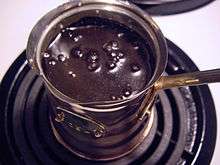Decoction
Decoction is a method of extraction by boiling herbal or plant material to dissolve the chemicals of the material, which may include stems, roots, bark and rhizomes. Decoction involves first mashing the plant material to allow for maximum dissolution, and then boiling in water to extract oils, volatile organic compounds and other various chemical substances.[1] Decoction can be used to make tisanes, tinctures and similar solutions. Decoctions and infusions may produce liquids with differing chemical properties as the temperature and/or preparation difference may result in more oil-soluble chemicals in decoctions versus infusions. The process can also be applied to meats and vegetables to prepare bouillon or stock,[2] though the term is typically only used to describe boiled plant extracts, usually for medicinal or scientific purposes.

Decoction is also the name for the resulting liquid. Although this method of extraction differs from infusion and percolation, the resultant liquids can sometimes be similar in their effects, or general appearance and taste.
Etymology
The term dates back to 1350–1400[3] from present participle stem of Latin decoquere (meaning to boil down), de "from" + coquere "to cook".[4]
Use
In brewing, decoction mashing is the traditional method where a portion of the mash is removed to a separate vessel, boiled for a time and then returned to the main mash, raising the mash to the next temperature step.
In herbalism, decoctions are usually made to extract fluids from hard plant materials such as roots and bark. To achieve this, the plant material is usually boiled for 1–2 hours in 1-5 liters of water. It is then strained. Ayurveda also utilizes this method to create Kashayam type of herbal medicines.
For teas, decoction involves boiling the same amount of the herb and water that would be used for an infusion (one teaspoon per cup) for about five to ten minutes.
References
- Biology-online.org
- Courtine, Robert J.; et al., eds. (1988) [French edition published 1984]. Larousse Gastronomique (English ed.). p. 362. ISBN 0-600-32390-0.
- "Dictionary.reference.com". Dictionary.reference.com. Retrieved 2018-05-29.
- Etymonline.com
External links
| Look up decoction in Wiktionary, the free dictionary. |
- How To Make a Herbal Decoction from unexplainable.net